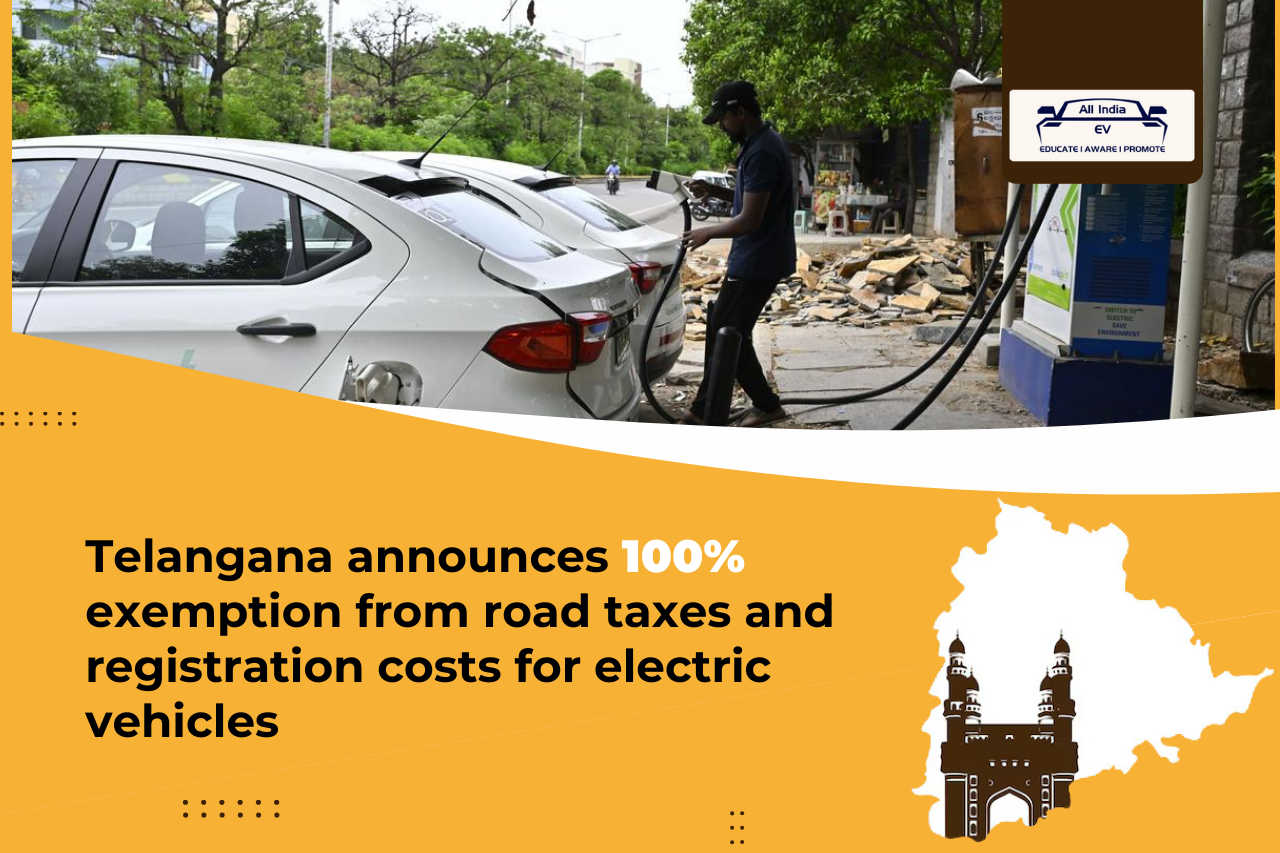
Telangana Launches Landmark EV Policy: Full Tax Exemptions to Drive Green Mobility
Telangana has introduced a revolutionary policy to promote sustainable mobility by providing a 100% exemption on road tax and registration fees for electric vehicles (EVs). Announced by Transport Minister Ponnam Prabhakar, this policy will be effective for two years, up to December 31, 2026. It covers a wide range of EVs, including two-wheelers, four-wheelers, autorickshaws, light goods carriers, and buses.
TSRTC buses and industry-owned vehicles exclusively used for employee transport will enjoy lifetime exemptions. The initiative aims to increase EV adoption, reduce urban pollution, and establish Hyderabad as a cleaner, greener city. In addition to financial incentives, the government has urged EV manufacturers to focus on developing charging stations to support growing user demands.
A Bold Tax Exemption Policy
Telangana’s new EV policy is a landmark decision to accelerate the adoption of electric vehicles by eliminating financial barriers for buyers. The government has announced a 100% exemption on road tax and registration fees for a diverse range of EVs, including two-wheelers, four-wheelers, commercial passenger vehicles like taxis, three-seater autorickshaws, tractors, and buses.
This exemption is valid for two years, up to December 31, 2026, irrespective of the number of EVs registered within this period. A key highlight is the lifetime exemption for TSRTC-operated buses and industry-owned buses used exclusively for employee transport, provided they are not utilized for commercial purposes.
Key Features of the Policy
- 100% Exemption: Road tax and registration fees are waived for all eligible EVs.
- Diverse Vehicle Coverage: Includes two-wheelers, four-wheelers, taxis, three-seater autorickshaws, goods carriers, and buses.
- Lifetime Exemptions for Public Buses: TSRTC buses and industry-operated employee transport vehicles benefit for their entire lifespan.
- Validity Period: Initial implementation phase extends until December 31, 2026.
- Infrastructure Development: EV manufacturers are urged to establish sufficient charging stations.
- Environmental Benefits: Aims to significantly lower pollution levels in urban areas.
- Public Awareness: Campaigns to educate citizens on EV adoption and its long-term advantages are planned.
- Proactive Governance: The government has ensured coordination across departments for smoother policy execution.
Learning from Experience
The Telangana government’s EV policy has been crafted with lessons from Delhi’s struggles with pollution and ineffective policy execution. Minister Ponnam Prabhakar emphasized that this initiative is designed to prevent Hyderabad from facing similar challenges. Telangana’s earlier EV policy for 2020-30 had limited impact due to poor implementation.
Acknowledging these shortcomings, officials, including the Transport Minister, Special Chief Secretary Vikas Raj, and Transport Commissioner Surendra Mohan, visited four states to analyze successful EV initiatives. Insights gained from these visits helped shape a policy tailored to the state’s specific requirements. The revamped strategy focuses on timely implementation, creating awareness among the public about EV benefits, and fostering industry collaboration.
Infrastructure and Future Prospects
In addition to financial incentives, the Telangana government has prioritized infrastructure development to support EV users. The state has urged EV manufacturers to take the lead in setting up charging stations to eliminate challenges related to recharging. A major step in this direction was the recent inauguration of a new EV charging hub near Hyderabad airport, signaling the government’s proactive approach.
To streamline implementation, a coordination meeting involving key departments such as Transport, Home, and HMDA is planned to address logistical and regulatory hurdles. Currently, 1.7 lakh EVs are registered in Telangana, representing 5% of the state’s total










